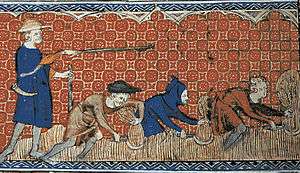Socage

Socage (/ˈsɒkᵻdʒ/)[1] was one of the feudal duties and hence land tenure forms in the feudal system. A farmer, for example, held the land in exchange for a clearly defined, fixed payment to be made at specified intervals to his feudal lord, who in turn had his own feudal obligations, to the farmer and to the Crown. In theory this might involve supplying the lord with produce but most usually it meant a straightforward payment of cash, i.e., rent.
In this respect it contrasted with other forms of tenure including serjeanty (the farmer paid no rent but had to perform some personal/official service on behalf of his lord, including in times of war) and frankalmoin (some form of religious service). For those higher in the feudal hierarchy, there was also knight-service (military service) as a condition of land tenure.
The English statute Quia Emptores of Edward I (1290) established that socage tenure passed automatically from one generation to the next (unlike leases). As feudalism declined, socage tenure increased until it became the normal form of tenure in the Kingdom of England. In 1660, the Statute of Tenures ended the remaining forms of military service and all freehold tenures were converted into socage.
The holder of a soc or socage tenure was referred to as a socager (Anglo-Norman) or socman (Anglo-Saxon, also spelt sochman[2]). In German-speaking Europe, the broad equivalent was a Dienstmann.
See also
References
- ↑ Wells, John C. (1990). Longman pronunciation dictionary. Harlow, England: Longman. p. 658. ISBN 0-582-05383-8. entry "socage"
- ↑ Partington, S W (1909), "2", The Danes in Lancashire and Yorkshire, retrieved 2012-05-15,
Tenants who owned such tenures were called 'sochmen,' and the tenure itself was called 'socage'
External links
 Vinogradoff, Paul (1911). "Socage". Encyclopædia Britannica (11th ed.).
Vinogradoff, Paul (1911). "Socage". Encyclopædia Britannica (11th ed.).